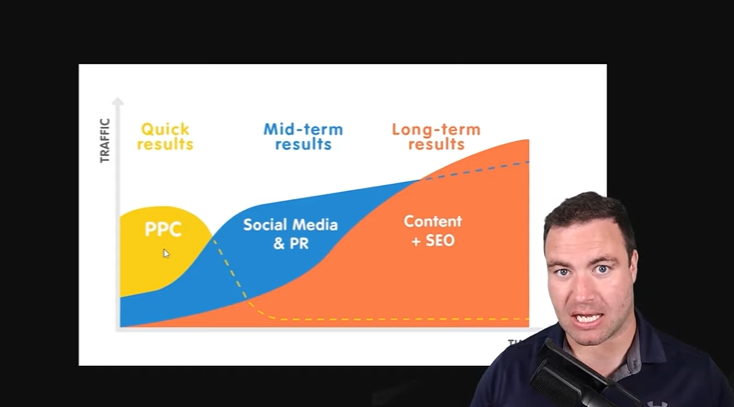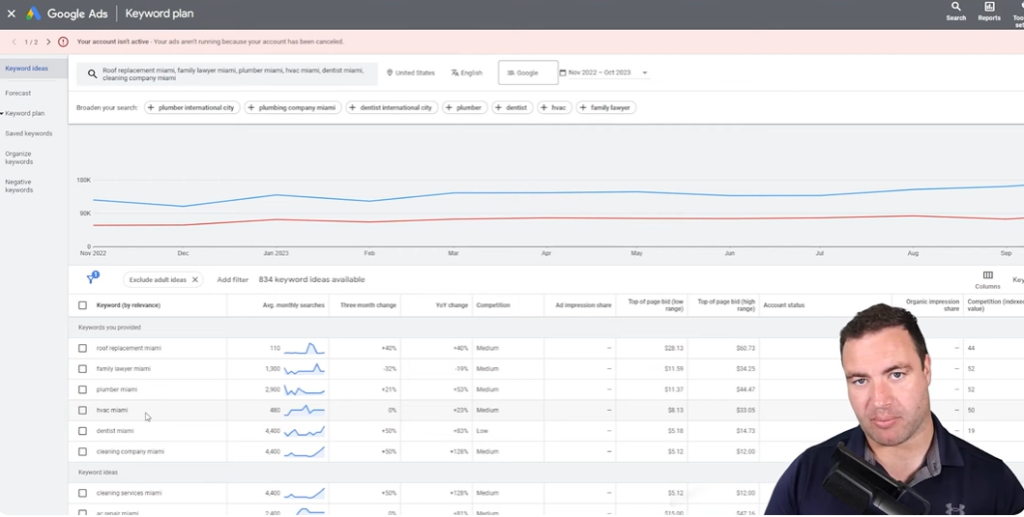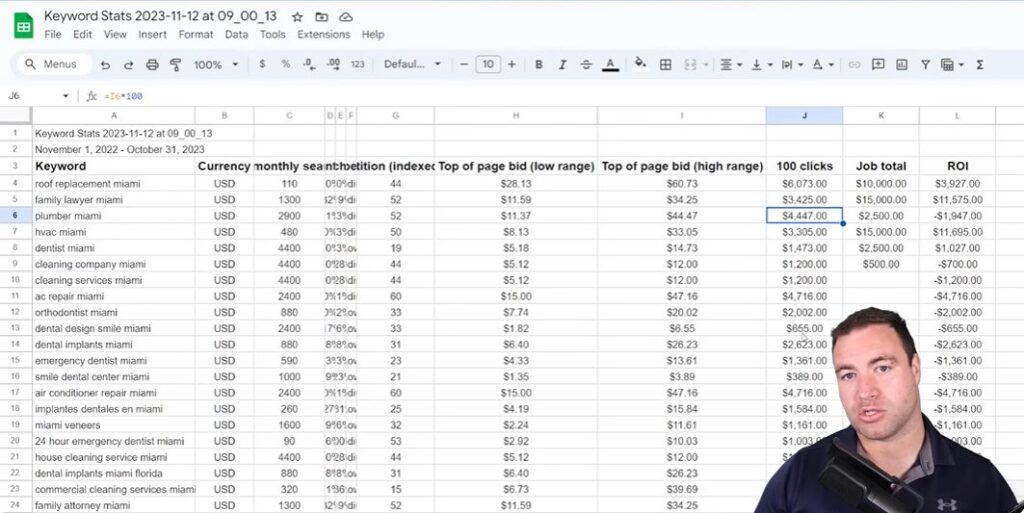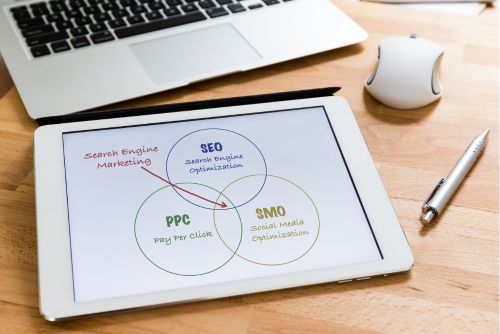G'day! As a digital marketer, I've often found myself at the crossroads of PPC and SEO. Let me share a little story: Just a few months back, I met a roofer who was frustrated with his lacking online visibility. His big question for me was simple yet profound: 'Should I invest in PPC ads, or is SEO the way to go?' It made me realize how many of us grapple with this dilemma, and today, I'm here to shed light on both strategies, helping you to make a decision that resonates with your business goals.
TL;DR: Choosing between SEO vs PPC? Learn the pros and cons of each, how to analyze your unique situation, and make an informed decision that boosts your business visibility and profitability.
Let’s start with the basics. PPC stands for Pay-Per-Click. This is an advertising model where businesses pay a fee every time someone clicks on their ad. Think of it as buying visits to your site. On the other hand, SEO or Search Engine Optimization is all about optimizing your website to rank higher in organic search results. Essentially, with PPC, you pay for visibility, while with SEO, you earn it.
Have you ever noticed those ads that appear at the top of your Google search results? Those are PPC ads. They're typically labeled as "sponsored" and grab your attention immediately. In contrast, organic results usually appear underneath these ads and are based on the quality of the content rather than payment.
Picture this: You search for a popular term like "Best coffee maker." The first few results that pop up are PPC ads. They can generate immediate traffic. But scroll down a bit, and you'll see more trusted results. This is where the power of SEO shines. It may take time to achieve, but those top organic rankings often lead to better long-term engagement.
Now, let’s talk money. With PPC, your initial investment can be significant. You might spend costs from as little as a few cents to over a hundred dollars per click. In contrast, SEO requires a different kind of investment. You need to allocate budget for content creation, website optimization, and perhaps even hiring a digital marketing expert. But, here’s the kicker: while PPC can cost you upfront, SEO has the potential for a higher return on investment over time.
When we consider target demographics, PPC often allows for precise targeting. You can choose who sees your ads based on location, interests, age, and more. This targeted approach helps businesses connect with specific segments of their audience. SEO, however, tends to draw users who are actively searching for relevant information or products. It’s a more organic reach but takes more time to develop.
Here’s where the big contrast lies. PPC offers instant visibility. If you need quick leads or have a time-sensitive offer, PPC can be incredibly powerful. However, the moment you stop paying, that visibility vanishes. SEO, on the other hand, is a long-term strategy. It requires patience and consistency. Over time, good SEO practices can lead to sustained traffic without the need for ongoing payment.
So, what’s the best strategy for your business? It often boils down to your immediate needs versus your long-term goals. If you're looking to build brand awareness and patience is a virtue, SEO is for you. If you're in a rush to see results, PPC might just be your go-to solution.

Pay-Per-Click (PPC) advertising can be a powerful tool for businesses. Here are some key advantages:
However, there are some downsides:
Search Engine Optimization (SEO) offers its own set of strengths:
But SEO isn’t without challenges:
When evaluating costs and returns, it varies by industry. For instance, in the roofing sector, I’ve seen how a $6,000 PPC investment can lead to contracts averaging $40,000. That’s a pretty attractive ROI.
In contrast, industries like plumbing might not fare as well. They often have high operational costs, leading to poor return ratios when relying heavily on PPC. This highlights the importance of evaluating your niche.
PPC is ideal when you need quick leads. If you're launching a new product or facing a seasonal rush, this route is beneficial. On the other hand, SEO is the way to go for long-term growth and brand building.
Do you want results fast? Go PPC. Want credibility? Focus on SEO. This best explains SEO vs PPC.
From my experience, I’ve utilized both strategies. Initially, I relied heavily on PPC. The instant gratification was nice, but my finance department wasn’t thrilled when the bills came in. Then I turned to SEO. Over time, leveraging quality content has significantly paid off.
Analyzing my strategies allowed me to balance both approaches, attracting leads immediately while fostering a sustainable, trustworthy online presence. This blend has been a game-changer for my business.

First things first, we need to take a good look at where we stand online. It’s crucial. Think of it as taking a selfie of your business. Are you putting your best face forward?
Start by asking yourself:
Analyzing your business's online presence helps identify strengths and weaknesses. Make a list. Sometimes, seeing things on paper creates clarity.
One tool I can't stress enough is the Google Ads Keyword Planner. This gem will help you uncover potential keywords to target for your campaigns. It’s like a treasure map leading you to valuable leads.
To use it:
For example, if you’re in the roofing business and search for “roof replacement Miami,” look closely. The high-end bid range tells you how much you’ll spend per click.
Ever wondered what others in your field are up to? Evaluating your competitors’ PPC strategies can provide invaluable insights. It’s like peeking at your neighbor’s yard to see what works for them.
Here’s what I recommend:
Great news! There are plenty of free resources for those just starting. You don't have to spend a fortune to get valuable insights.
Using these tools, you can gather essential data without breaking the bank.
Lastly, don’t shy away from seeking help. Sometimes, it pays to consult the pros. Have you ever felt overwhelmed by the data?
Consider if it's time to involve experts when:
Consulting with professionals can save you headaches and money. It’s about finding the right strategy for your business.

When diving into the world of Pay-Per-Click (PPC) and Search Engine Optimization (SEO), understanding costs is crucial. What expenses can you expect? Both methods require investment, but their costs can vary greatly. PPC campaigns can start small but can escalate quickly depending on competition and keywords. You might spend $1 for a click or upwards of $20. That's quite a difference!
SEO, on the other hand, is more of a long game. You won't pay per click, but you will pay for content creation, link building, and possibly hiring experts to optimize your site. While initial costs may seem steep, the long-term benefits can be substantial. In my experience, the ROI from effective SEO can reach $3 to $5 for every $1 spent.
Analyzing profit margins is essential. If I invest in PPC and see a minimal return, what’s the point? Let’s consider an example: you spend $6,000 for PPC ads in the roofing industry, targeting high-value leads. With a typical contract worth $40,000, the ROI looks promising.
But, if your industry’s margins are tighter, like plumbing, that same investment may not yield favorable results. This thorough assessment is vital. Is the profit worth the investment? We shouldn’t just jump into campaigns without knowing how they align with our financial goals.
Budgeting isn't just for individuals. Businesses must also be careful with their finances. Effective management means setting aside a clear budget for PPC and SEO. I recommend percentages of your total budget based on your performance estimates. For instance:
Tracking expenses in real-time can help prevent overspending and keep campaigns focused.
Think of spending on PPC and SEO as an investment in your business. Just like stocks, you don’t just buy and forget. Regularly analyze your returns. Are you gaining traction? Are leads converting to sales? Every dollar spent should work towards growth.
When I look at my analytics, I often ask myself, “Is this working for me?” This mindset can shift spending from being a burden into an opportunity for expansion.
Data is your best friend in digital marketing. Use analytics tools to monitor your campaigns daily. I prefer using tools like Google Analytics and Ads Reporting to visualize ROI. If something isn’t performing as expected, it’s crucial to pivot quickly. Perhaps changing keywords or halting an ineffective campaign.
Remember, flexibility is key. Just because you initially planned a certain path doesn’t mean you’re locked into it. Don’t be afraid to adjust. Stay nimble.

When we dive into marketing strategies, a fundamental debate arises: long-term vs. short-term. Have you ever noticed how some businesses seem to pop up overnight while others build their presence slowly over years? Short-term strategies, like PPC (Pay-Per-Click), deliver swift results. You might launch a Google Ads campaign, and voilà - your business appears at the top of search results in no time. Sounds great, right?
However, the flip side often involves increased costs without guaranteed returns. Think about it: If you're spending money on ads every month and not earning it back, is that sustainable? On the other hand, there’s SEO, which is all about the long game. It takes time, effort, and a whole lot of patience to climb those search engine ranks. But once you’re established, you can enjoy the sweet benefits of organic traffic, often returning $3 to $5 for every dollar spent. It’s like planting a tree; with careful nurturing, the longer you wait, the more fruit it yields.
So, should we choose one approach over the other? Not necessarily. I believe in the power of combination. By merging short-term tactics like PPC with long-term strategies like SEO, we can create a robust marketing plan. For instance, while your SEO efforts take root, PPC can provide immediate visibility. This dual approach allows us to cater to immediate needs while ensuring a sustained growth trajectory.
Speaking of growth, let’s talk about adapting to new trends in digital marketing. The digital landscape is ever-changing. Every day, new tools and strategies emerge. Staying on top of these trends isn’t just beneficial; it’s essential. Businesses that cling to outdated methods risk falling behind. Ask yourself: are you keeping up? If not, now’s the time to pivot and explore new avenues!
Next, we must focus on building trust and authority within our niche. It’s not enough to throw a bunch of content out there and hope for the best. Genuine trust comes from consistent, quality engagement with your audience. When they see your brand as a reliable source of information, they're more likely to convert. This could mean creating valuable blog posts, engaging on social media, or even providing free tools or consultations.
Finally, let’s emphasize the power of investing in learning and continuous improvement. The marketing world is rich with resources. From online courses to workshops, embracing learning can offer fresh insights to sharpen our strategies. Are you investing in your knowledge? In a field that evolves swiftly, continuous improvement can be your ticket to staying ahead of the game.
In our quest for effective marketing, it’s clear we need a balanced approach, openness to adapt, and an unwavering commitment to building trust. We’re on this journey together! Let’s keep exploring.
As we wrap up this exploration of SEO vs PPC, it's essential to reflect on the key points we've analyzed. Both strategies offer distinct advantages and challenges. PPC can deliver instant leads but often doesn't offer the best return on investment in the long run. In contrast, SEO takes time and effort to establish but can yield a significantly better ROI. It’s clear that understanding your business needs can greatly influence your choice.
I'd love to hear your thoughts. Have you had experiences with either of these strategies? What worked for you? Engaging with you on this topic could help all of us better navigate these waters. Sharing our experiences can pave the way for learning and improvement, and I am here to listen.
If you’re unsure about your approach or need help customizing your strategy, I encourage you to reach out for further consultation. My journey has taught me that partnering with knowledgeable digital marketers can provide the insights necessary to make confident decisions and avoid pitfalls. Don’t hesitate to ask for guidance; sometimes, a fresh perspective can make a world of difference.
Reflecting on my own path, I can tell you that the digital marketing landscape is complex. I started out just focused on PPC, intrigued by its immediate results. However, over time, I realized that SEO’s long-term benefits were undeniable. It taught me the value of persistence and the importance of building a trustworthy online presence. Trust me; it’s a journey worth embarking upon.
In my experience, leveraging both PPC and SEO has been the most effective strategy. While PPC provides that quick access to potential clients, SEO is an investment in your future. Just as a garden takes time to grow, so does your online authority. The dual approach allows you to benefit from both immediate and long-lasting results. Whether you decide to dive deep into PPC, pursue SEO, or blend both strategies, find what suits your particular situation.
Ultimately, your decision should align with your specific business needs and budget constraints, as well as the dynamics of your market. I’m here to help guide you through these choices. So, let’s connect further! Together, we can navigate this fascinating landscape of digital marketing, ensuring that you find the right path toward success. Thank you for joining me on this journey, and I look forward to hearing from you!